Employability and Career Development Theory Analysis and Reflection
VerifiedAdded on 2023/04/23
|5
|831
|74
Report
AI Summary
This report analyzes employability and career development, focusing on skills such as problem-solving, teamwork, and cross-cultural competency. It examines how these skills are crucial in today's globalized workplace, where adaptability and understanding of diverse perspectives are essential. The report explores career development theories, including trait, learning, cognitive, and developmental theories, and how they influence career choices and planning. It emphasizes the importance of self-assessment tools in identifying strengths, weaknesses, and career paths aligned with individual interests and aspirations. The report also references relevant literature to support its analysis, providing a comprehensive overview of employability and career development.
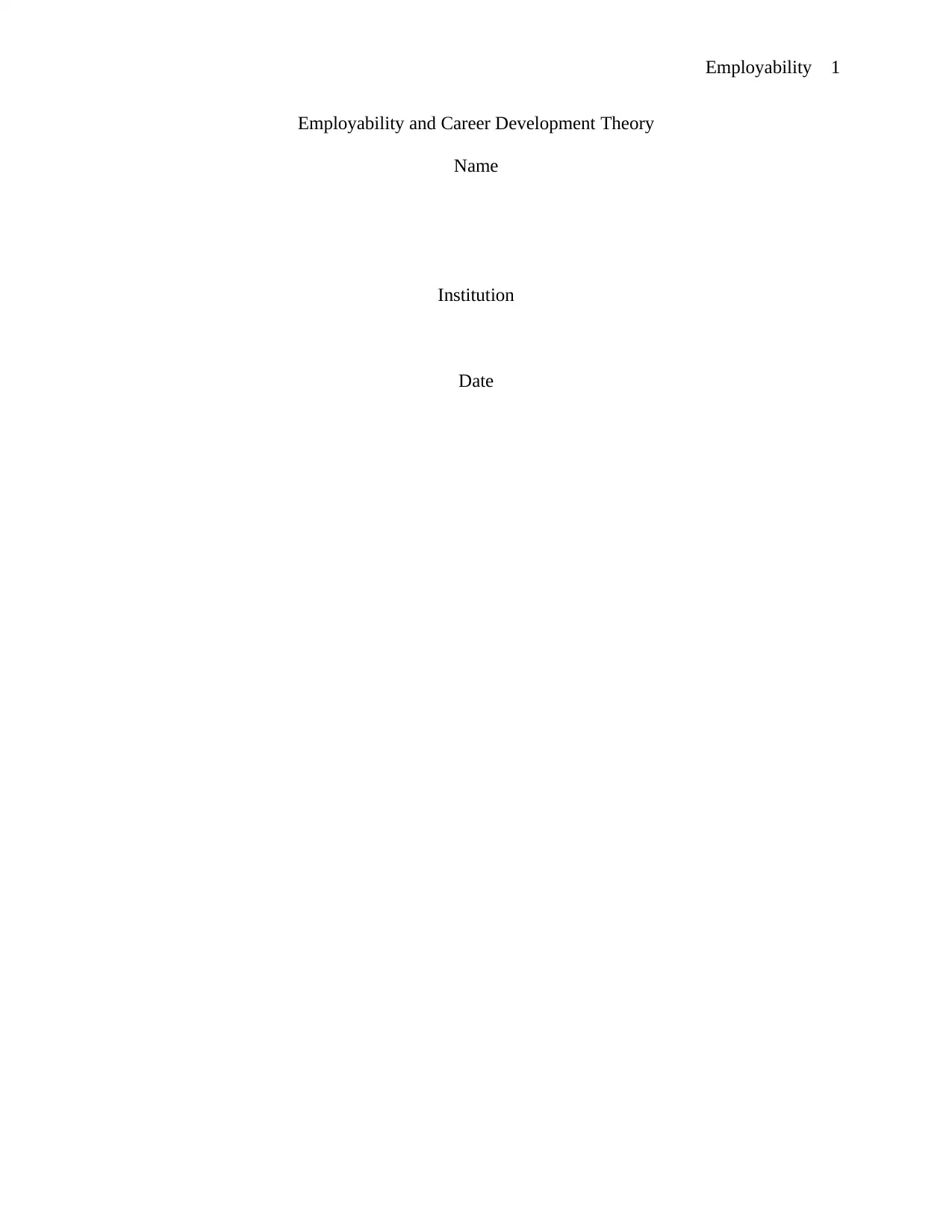
Employability 1
Employability and Career Development Theory
Name
Institution
Date
Employability and Career Development Theory
Name
Institution
Date
Paraphrase This Document
Need a fresh take? Get an instant paraphrase of this document with our AI Paraphraser
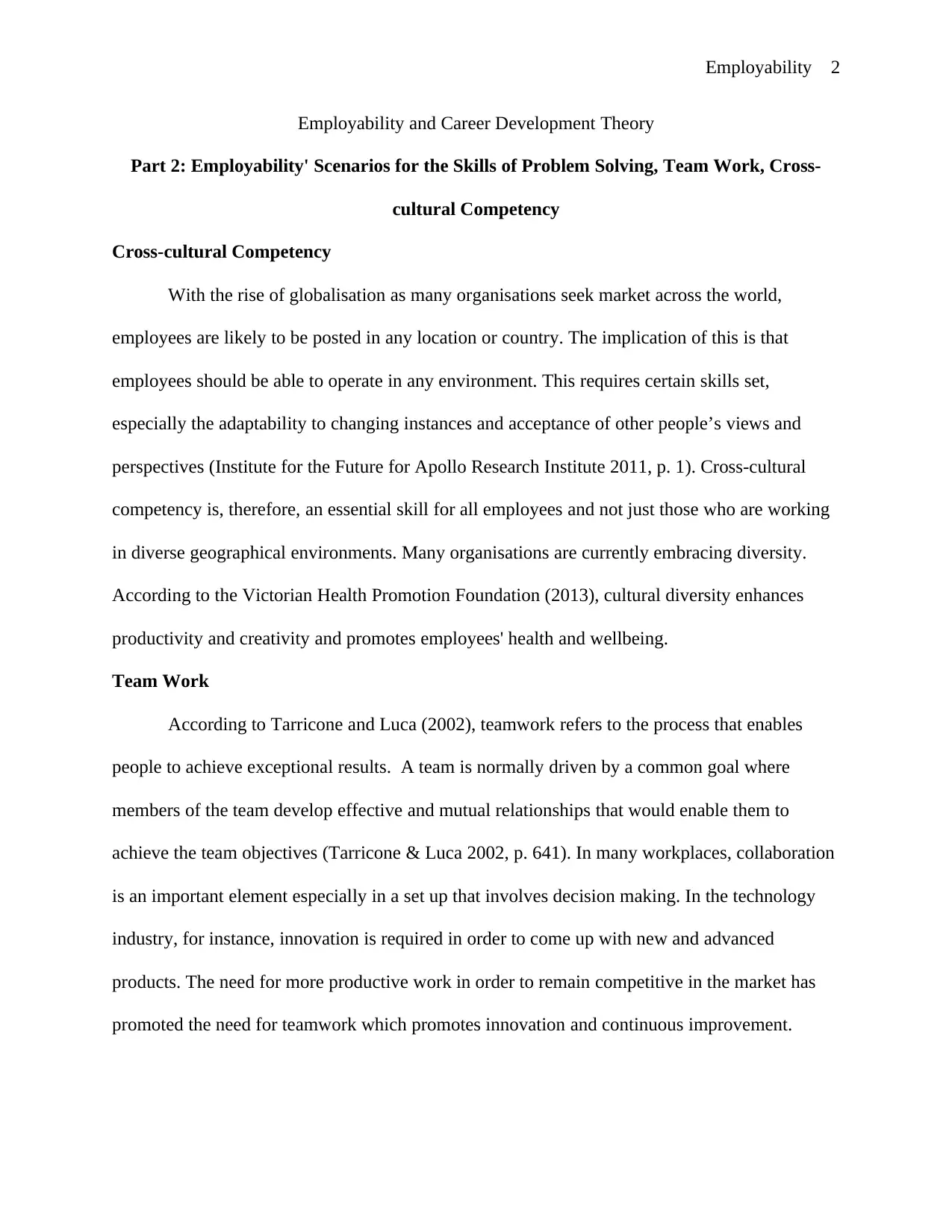
Employability 2
Employability and Career Development Theory
Part 2: Employability' Scenarios for the Skills of Problem Solving, Team Work, Cross-
cultural Competency
Cross-cultural Competency
With the rise of globalisation as many organisations seek market across the world,
employees are likely to be posted in any location or country. The implication of this is that
employees should be able to operate in any environment. This requires certain skills set,
especially the adaptability to changing instances and acceptance of other people’s views and
perspectives (Institute for the Future for Apollo Research Institute 2011, p. 1). Cross-cultural
competency is, therefore, an essential skill for all employees and not just those who are working
in diverse geographical environments. Many organisations are currently embracing diversity.
According to the Victorian Health Promotion Foundation (2013), cultural diversity enhances
productivity and creativity and promotes employees' health and wellbeing.
Team Work
According to Tarricone and Luca (2002), teamwork refers to the process that enables
people to achieve exceptional results. A team is normally driven by a common goal where
members of the team develop effective and mutual relationships that would enable them to
achieve the team objectives (Tarricone & Luca 2002, p. 641). In many workplaces, collaboration
is an important element especially in a set up that involves decision making. In the technology
industry, for instance, innovation is required in order to come up with new and advanced
products. The need for more productive work in order to remain competitive in the market has
promoted the need for teamwork which promotes innovation and continuous improvement.
Employability and Career Development Theory
Part 2: Employability' Scenarios for the Skills of Problem Solving, Team Work, Cross-
cultural Competency
Cross-cultural Competency
With the rise of globalisation as many organisations seek market across the world,
employees are likely to be posted in any location or country. The implication of this is that
employees should be able to operate in any environment. This requires certain skills set,
especially the adaptability to changing instances and acceptance of other people’s views and
perspectives (Institute for the Future for Apollo Research Institute 2011, p. 1). Cross-cultural
competency is, therefore, an essential skill for all employees and not just those who are working
in diverse geographical environments. Many organisations are currently embracing diversity.
According to the Victorian Health Promotion Foundation (2013), cultural diversity enhances
productivity and creativity and promotes employees' health and wellbeing.
Team Work
According to Tarricone and Luca (2002), teamwork refers to the process that enables
people to achieve exceptional results. A team is normally driven by a common goal where
members of the team develop effective and mutual relationships that would enable them to
achieve the team objectives (Tarricone & Luca 2002, p. 641). In many workplaces, collaboration
is an important element especially in a set up that involves decision making. In the technology
industry, for instance, innovation is required in order to come up with new and advanced
products. The need for more productive work in order to remain competitive in the market has
promoted the need for teamwork which promotes innovation and continuous improvement.
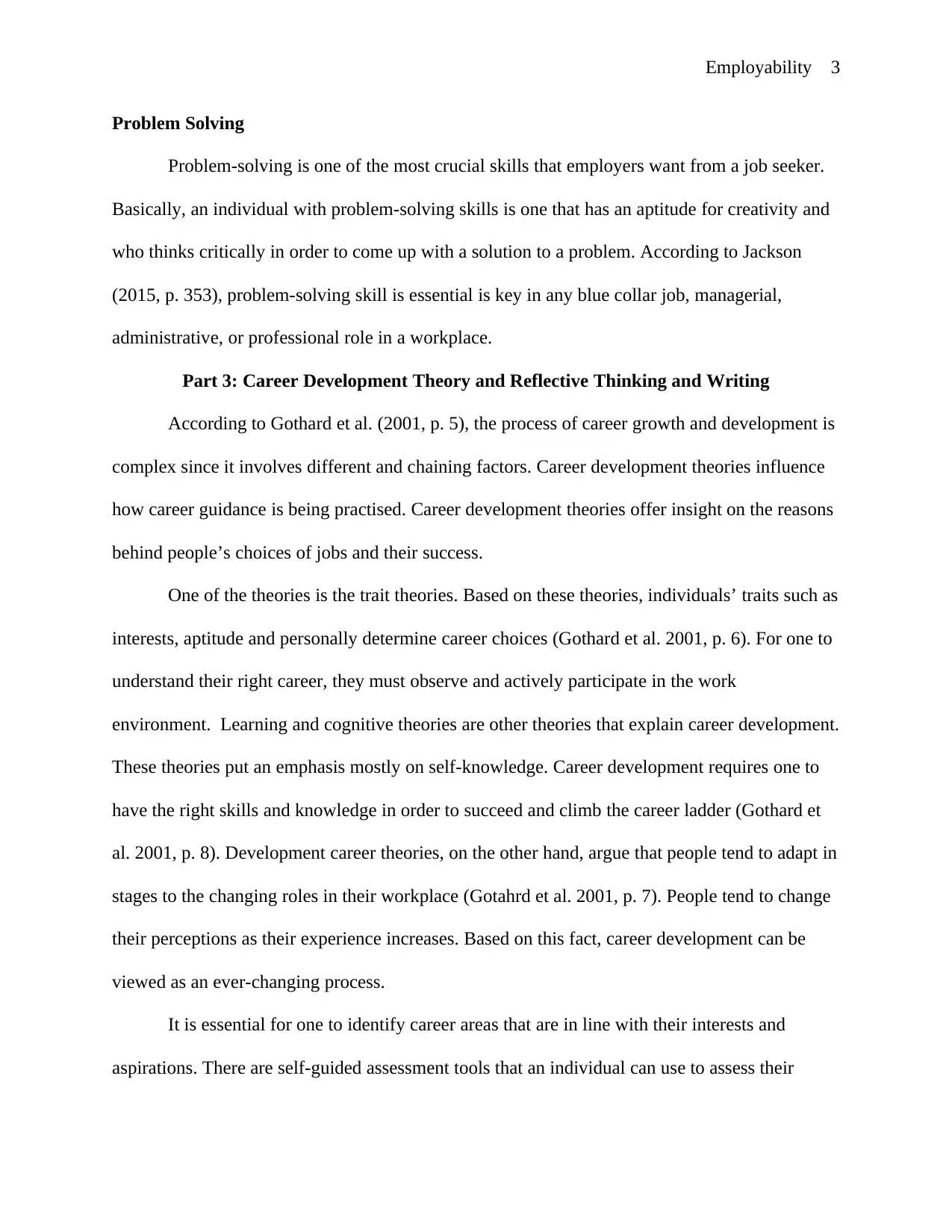
Employability 3
Problem Solving
Problem-solving is one of the most crucial skills that employers want from a job seeker.
Basically, an individual with problem-solving skills is one that has an aptitude for creativity and
who thinks critically in order to come up with a solution to a problem. According to Jackson
(2015, p. 353), problem-solving skill is essential is key in any blue collar job, managerial,
administrative, or professional role in a workplace.
Part 3: Career Development Theory and Reflective Thinking and Writing
According to Gothard et al. (2001, p. 5), the process of career growth and development is
complex since it involves different and chaining factors. Career development theories influence
how career guidance is being practised. Career development theories offer insight on the reasons
behind people’s choices of jobs and their success.
One of the theories is the trait theories. Based on these theories, individuals’ traits such as
interests, aptitude and personally determine career choices (Gothard et al. 2001, p. 6). For one to
understand their right career, they must observe and actively participate in the work
environment. Learning and cognitive theories are other theories that explain career development.
These theories put an emphasis mostly on self-knowledge. Career development requires one to
have the right skills and knowledge in order to succeed and climb the career ladder (Gothard et
al. 2001, p. 8). Development career theories, on the other hand, argue that people tend to adapt in
stages to the changing roles in their workplace (Gotahrd et al. 2001, p. 7). People tend to change
their perceptions as their experience increases. Based on this fact, career development can be
viewed as an ever-changing process.
It is essential for one to identify career areas that are in line with their interests and
aspirations. There are self-guided assessment tools that an individual can use to assess their
Problem Solving
Problem-solving is one of the most crucial skills that employers want from a job seeker.
Basically, an individual with problem-solving skills is one that has an aptitude for creativity and
who thinks critically in order to come up with a solution to a problem. According to Jackson
(2015, p. 353), problem-solving skill is essential is key in any blue collar job, managerial,
administrative, or professional role in a workplace.
Part 3: Career Development Theory and Reflective Thinking and Writing
According to Gothard et al. (2001, p. 5), the process of career growth and development is
complex since it involves different and chaining factors. Career development theories influence
how career guidance is being practised. Career development theories offer insight on the reasons
behind people’s choices of jobs and their success.
One of the theories is the trait theories. Based on these theories, individuals’ traits such as
interests, aptitude and personally determine career choices (Gothard et al. 2001, p. 6). For one to
understand their right career, they must observe and actively participate in the work
environment. Learning and cognitive theories are other theories that explain career development.
These theories put an emphasis mostly on self-knowledge. Career development requires one to
have the right skills and knowledge in order to succeed and climb the career ladder (Gothard et
al. 2001, p. 8). Development career theories, on the other hand, argue that people tend to adapt in
stages to the changing roles in their workplace (Gotahrd et al. 2001, p. 7). People tend to change
their perceptions as their experience increases. Based on this fact, career development can be
viewed as an ever-changing process.
It is essential for one to identify career areas that are in line with their interests and
aspirations. There are self-guided assessment tools that an individual can use to assess their
⊘ This is a preview!⊘
Do you want full access?
Subscribe today to unlock all pages.

Trusted by 1+ million students worldwide
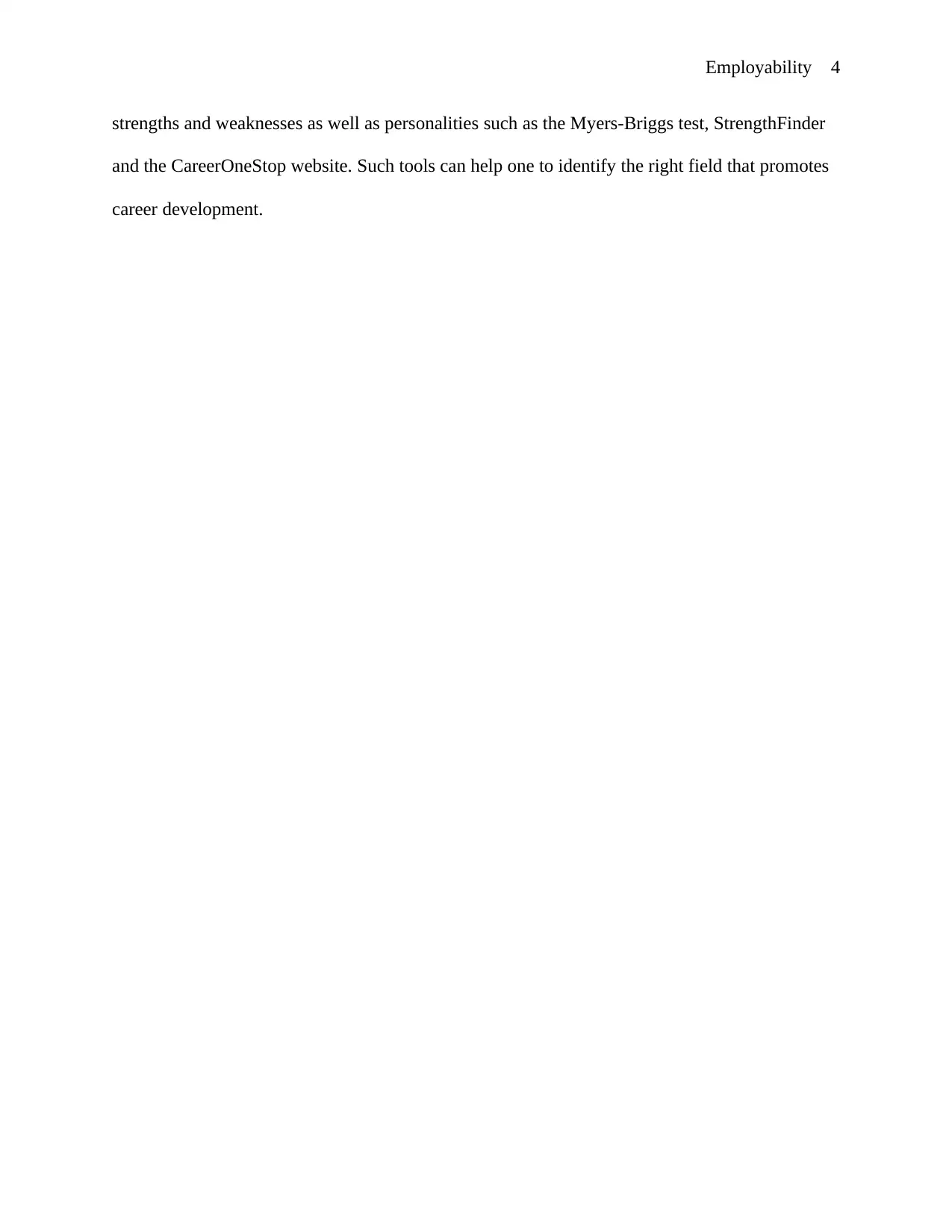
Employability 4
strengths and weaknesses as well as personalities such as the Myers-Briggs test, StrengthFinder
and the CareerOneStop website. Such tools can help one to identify the right field that promotes
career development.
strengths and weaknesses as well as personalities such as the Myers-Briggs test, StrengthFinder
and the CareerOneStop website. Such tools can help one to identify the right field that promotes
career development.
Paraphrase This Document
Need a fresh take? Get an instant paraphrase of this document with our AI Paraphraser
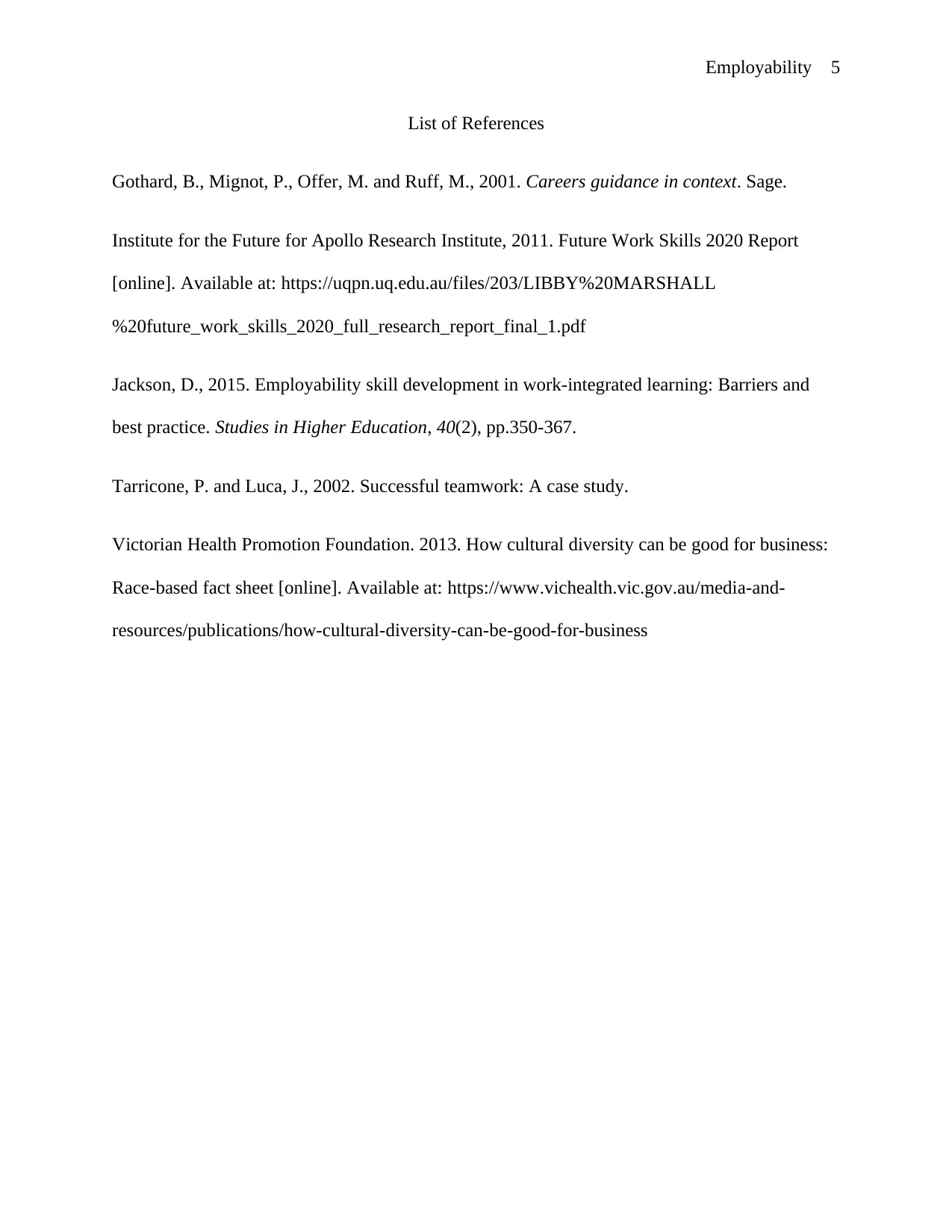
Employability 5
List of References
Gothard, B., Mignot, P., Offer, M. and Ruff, M., 2001. Careers guidance in context. Sage.
Institute for the Future for Apollo Research Institute, 2011. Future Work Skills 2020 Report
[online]. Available at: https://uqpn.uq.edu.au/files/203/LIBBY%20MARSHALL
%20future_work_skills_2020_full_research_report_final_1.pdf
Jackson, D., 2015. Employability skill development in work-integrated learning: Barriers and
best practice. Studies in Higher Education, 40(2), pp.350-367.
Tarricone, P. and Luca, J., 2002. Successful teamwork: A case study.
Victorian Health Promotion Foundation. 2013. How cultural diversity can be good for business:
Race-based fact sheet [online]. Available at: https://www.vichealth.vic.gov.au/media-and-
resources/publications/how-cultural-diversity-can-be-good-for-business
List of References
Gothard, B., Mignot, P., Offer, M. and Ruff, M., 2001. Careers guidance in context. Sage.
Institute for the Future for Apollo Research Institute, 2011. Future Work Skills 2020 Report
[online]. Available at: https://uqpn.uq.edu.au/files/203/LIBBY%20MARSHALL
%20future_work_skills_2020_full_research_report_final_1.pdf
Jackson, D., 2015. Employability skill development in work-integrated learning: Barriers and
best practice. Studies in Higher Education, 40(2), pp.350-367.
Tarricone, P. and Luca, J., 2002. Successful teamwork: A case study.
Victorian Health Promotion Foundation. 2013. How cultural diversity can be good for business:
Race-based fact sheet [online]. Available at: https://www.vichealth.vic.gov.au/media-and-
resources/publications/how-cultural-diversity-can-be-good-for-business
1 out of 5
Related Documents
Your All-in-One AI-Powered Toolkit for Academic Success.
+13062052269
info@desklib.com
Available 24*7 on WhatsApp / Email
![[object Object]](/_next/static/media/star-bottom.7253800d.svg)
Unlock your academic potential
Copyright © 2020–2026 A2Z Services. All Rights Reserved. Developed and managed by ZUCOL.





